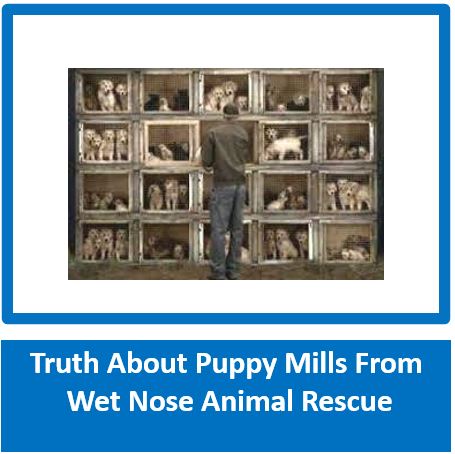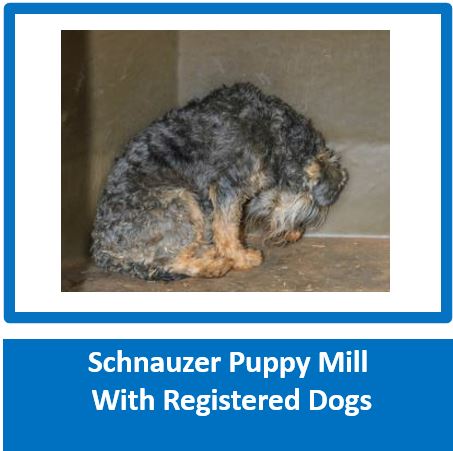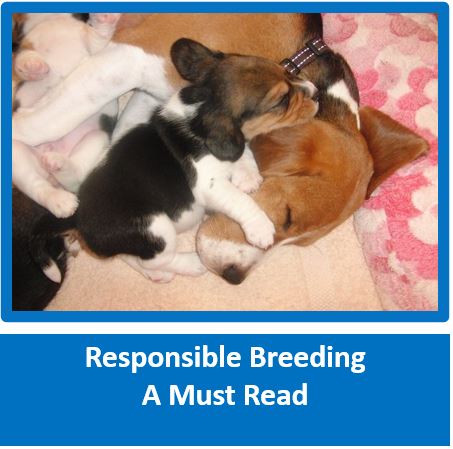What You Need To Know About Puppy Mills (and Backyard Breeders)
and tips on how to avoid them
by Scotty Valadao - Canine Behaviourist - Friends of the Dog
Article sponsored by Muttmix
and tips on how to avoid them
by Scotty Valadao - Canine Behaviourist - Friends of the Dog
Article sponsored by Muttmix
Each and every time we buy a pup on-line, at pet shops etc, we are reinforcing the reason why puppy mills exist - greed and total disregard for the dogs used in the breeding process and their pups. Unfortunately not everybody realizes that puppy mills can be the back yard breeder next door, not necessarily a formal set up outside of the suburbs!
It is estimated that 90% of pups in pet shops come from puppy mills - the 'breeder' gives the wholesaler 'their word' that the pups are healthy and bred properly, and the majority of pet shop owners do not even go and inspect for themselves.
In order to stop this terrible practice, we need to educate ourselves and spread the word to family and friends as to why they should rather purchase from a reputable breeder that is registered with KUSA, or even better, adopt from a shelter - on average pups that have passed their 'cute and sell by date' are dumped at shelters anyway!
We do not have statistics here in SA for how puppy mills exist, but in the US, there are estimated to be at least 10 thousand puppy mills, of which less that 3000 are regulated by the U.S Department of Agriculture.
Again, no statistics could be found in SA, however in America, it is estimated that over 2 million pups sold originated from puppy mills - but realize that approximately 3 million are killed in shelters that are no-kill, because they are too full and do not have homes for them.
According to the research we did on this topic, just one puppy mill can produce up to 600 pups per year, and the majority of these are sold at the same, or similar price that you can buy from a reputable, reliable registered breeder - see why puppy mills are a good source of income!
Here are some facts about puppy mills, plus we have put in some articles for you at the bottom to further educate yourself, and also some tips to avoid puppy mills.
FACTS
It is estimated that 90% of pups in pet shops come from puppy mills - the 'breeder' gives the wholesaler 'their word' that the pups are healthy and bred properly, and the majority of pet shop owners do not even go and inspect for themselves.
In order to stop this terrible practice, we need to educate ourselves and spread the word to family and friends as to why they should rather purchase from a reputable breeder that is registered with KUSA, or even better, adopt from a shelter - on average pups that have passed their 'cute and sell by date' are dumped at shelters anyway!
We do not have statistics here in SA for how puppy mills exist, but in the US, there are estimated to be at least 10 thousand puppy mills, of which less that 3000 are regulated by the U.S Department of Agriculture.
Again, no statistics could be found in SA, however in America, it is estimated that over 2 million pups sold originated from puppy mills - but realize that approximately 3 million are killed in shelters that are no-kill, because they are too full and do not have homes for them.
According to the research we did on this topic, just one puppy mill can produce up to 600 pups per year, and the majority of these are sold at the same, or similar price that you can buy from a reputable, reliable registered breeder - see why puppy mills are a good source of income!
Here are some facts about puppy mills, plus we have put in some articles for you at the bottom to further educate yourself, and also some tips to avoid puppy mills.
FACTS
- There is no vet care given to the mother while pregnant and ensuring that she is kept in the best of health.
- The mother is mated at each and every season, and is killed when she can no longer produce pups. If she even gets to 5 years of age, that means that she could have given birth to 10 litters of pups.
- The mother is seldom vaccinated, so the initial protection is not awarded to her pups. Pups are seldom vaccinated either even if the 'breeder' says they are. It has occurred vaccination certificates are often fraudulent or that expired vaccines are used to save on costs.
- The breeding dogs are often kept in terrible conditions, being kept in small, cramped cages with no room to exercise, move around, and with absolutely no mental or physical stimulation. Some are not kept in cages, but have a 'shelter' of some IBR placed on top of bricks. More often than not, the shelter awarded is not sufficient.
- Apart from being fed, the mom and pups seldom have any human contact, especially positive human interaction. This leads to dogs and pups that tend to be nervous and fearful of people.
- As regulations and inspections are not in place for cleanliness, dogs can live in situations whereby they are living in their own faeces and urine and there are flies and insects all over the place.
- As there is no control, dogs can have medical issue, such as eye infections, bleeding paws etc that are never treated.
- The food and water provided is often contaminated and pups can be malnourished and have worms and carry disease.
- They are often put up for adoption at 5 to 6 weeks of age when they look incredibly appealing. A pup should never be taken away from its mom and littermates before 8 weeks of age. Research has shown that pups taken away too early are more likely to end up with behaviour problems such as fear, aggression - have no knowledge of early canine body language and what is, and is not acceptable - have not developed any confidence or sense of self - do not know how to play with other dogs - never experienced their mom's discipline as to what behaviours are not acceptable.
- Pups that are not sold are either killed or end up in shelters. For both the mums and pups, the majority of puppy mills do not practice euthanasia. The dogs are killed in a cruel manner, including drowning and shooting.
- As there are no registered papers, there is no knowledge of the sire, and this can lead to a lot of interbreeding which can result in disease, disabilities and genetic problems being passed down.
- With a reputable breeder, in addition to the genetic aspect, the temperaments of the parents are taken into account, and dogs that are not suitable to breed with are never mated - this does not happen in puppy mills.
- In a puppy mill that has multiple breeds, cross breeding can occur, leaving you with a cross breed, rather than the pure bred you forked out money for.
- Due to the pups not receiving the care they should have, pups can infect people as well, especially with Campylobacter. Campylobacter causes an estimated 1.5 million illnesses in the US and the outbreak of 2017 of campylobacter was linked to puppies sold in Petland stores spanning across 17 states.
- Puppy mills are the number one cause of over population - this means that they are mostly directly responsible for the deaths of so many dogs that simply cannot find homes.
AVOIDING PUPPY MILLS
PLEASE SHARE THIS WITH FAMILY AND FRIENDS AND INCREASE KNOWLEDGE AND EDUCATION AND LET'S WORK TOGETHER TO PUT PUPPY MILLS OUT OF BUSINESS! IF YOU SUSPECT A PUPPY MILL PLEASE GET IN TOUCH WITH THE NSPCA.
Interesting reading - 31 Eye Opening Puppy Mill Statistics
Interesting reading - 101 Puppy Mills - A Sampling of Puppy Mills in the US
- First and foremost, do consider adopting from a shelter, or from a registered, reliable breeder that is KUSA registered. Although KUSA does not inspect the premises, and scams do happen, it is your best bet, but do your own homework.
- Always insist in visiting the premises where the puppies are being kept and really look around the property. If this is denied, walk away.
- Insists on seeing at least the mother (father may not always be available). This is where your puppy came from, and you can see the general condition of the mother, see her interaction with the pup, see if she is friendly and no reaction to other dogs that may be around. If mother is not available, walk away.
- If the 'breeder' offers to deliver the pup to you, or to meet you at a designated place, walk away.
- A good breeder will always ask you questions and more often than not want to inspect your home. These pups are his 'babies' and he will want to ensure that the hard work he put into breeding his pups, that they go to the correct homes.
- A good breeder will give you pups history by way of registration papers, including their vaccination certificate. The vac certificate should be stamped and signed by the breeders vet, not done themselves.
- A good breeder will only have pups available once a year, or once every two years and sticks, on average to only one breed. If there are multiple breeds there being bred, walk away.
- A good breeder normally only breeds the female when he knows that he has good homes for them. These breeders rarely need to advertise, the quality of their pups does it for them.
- If a 'breeder' tells you that your pup is the best of the litter and to contact him when ready to breed - walk away. No breeder worth his salt will sell the best of his litter - this is simply sales pitch.
- If a breeder does not want to find out with you what you are going to do about sterilization - walk away. Good breeders will request that the pup is sterilized at appropriate age, and may even make this a condition of sale - no way he wants his line bred with something inferior.
- Contact the breed rescues of your chosen breed and ask them to recommend a breeder they trust and can recommend.
PLEASE SHARE THIS WITH FAMILY AND FRIENDS AND INCREASE KNOWLEDGE AND EDUCATION AND LET'S WORK TOGETHER TO PUT PUPPY MILLS OUT OF BUSINESS! IF YOU SUSPECT A PUPPY MILL PLEASE GET IN TOUCH WITH THE NSPCA.
Interesting reading - 31 Eye Opening Puppy Mill Statistics
Interesting reading - 101 Puppy Mills - A Sampling of Puppy Mills in the US







